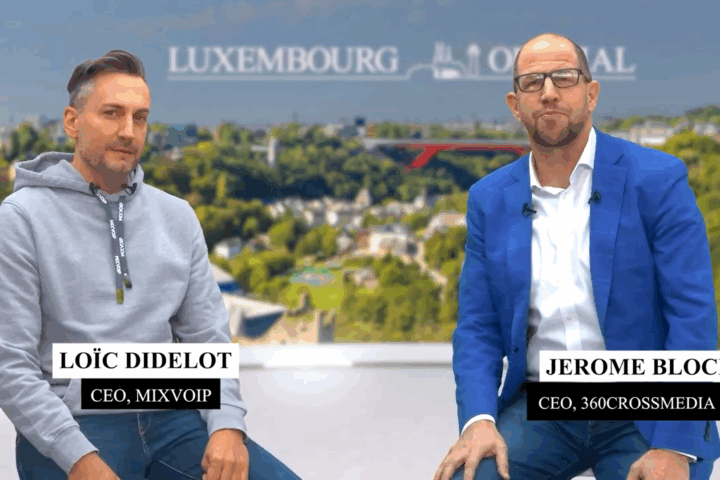Luc Frieden (Prime Minister): the quest for a growth consensus
Luc Frieden welcomed us in the Hotel de Bourgogne – where the Ministry of State is located- a few hours before flying to New York. “Ask all the questions that you want. No limits.”, he told us. We did.
Jerome Bloch: Mr Prime Minister, thank you for taking the time to answer my questions.
Luc Frieden: My pleasure. Happy to be here.
J.B: My first question for you, where are you in the implementation of the coalition agreement?
L.F: We are at the beginning of this government. A government has been elected for five years, but obviously a lot has to be done in the first three years because it takes time afterwards to go through parliament. In the 209 pages of our accord de coalition, our priorities are clear: And that is more purchasing power, more for young families, more renewable energy and more competitiveness. I have been elected on the idea that we need companies that are doing well, that create jobs, pay well, and pay taxes. A reasonable amount of taxes – that is why we lower taxes – and thereby we can finance the social needs that a country has, but also the ecological transition which will cost a lot of money, and I would even add the defence expenditures which were not foreseen when we started. That is the roadmap that I gave to this coalition and that is my plan every day. The rest are details, but of course each minister needs to implement the details. We have a rather broad majority in parliament in comparison to the previous two governments, so therefore we cannot fail, we have to implement this.
J.B: I’m always wondering if the population is aware of what you just described: first you make money and then you spend the money. Do people know how many percent of the corporate taxes come from finance? It’s official, 75%. Do citizens know that our economy is based on 3% of growth of GDP (4% after indexation). Do luxembourgers know that three workers out of four don’t vote? In short, do you think the population is well informed about our economy?
L.F: I think they are, but they try to forget. I think we are telling them. The majority of people know that. But it’s rather comfortable not to remind yourself every day that these are huge challenges. And it is a very atypical situation. It’s very rare that a country depends so much on one sector. We had it with steel, now we have with financial services, and we cannot replace that from one day to another. We can add things and surely, diversification is necessary. We will do it. I met many people during the election campaign: many are aware of the challenges we are facing now. Being aware of something does not yet mean that you accept changes. And I think we cannot do things with a revolution. We need to do it with an evolution. The difference between the private sector, in which I used to work in the past ten years, and running a country is that a democracy is slow because you need to build a majority. That is something positive compared to a dictatorship. We need to convince people that a certain number of things are necessary. I think we have a strong mandate to implement what we have promised and we will do so.
“A democracy is slow because you need to build a majority.”
J.B: A question about focus. I would like to give you an example from the Ministry of Economy: The official number of startups and scale ups is 519, on a website called Dealroom. Well, if you research a little bit, you realise that it is a completely absurd number, because it includes companies since 2003. My problem with that is that we have a lot of fantastic startups in the country, maybe ten, which find themselves lost in a so called 519 pool, which is not existing, and so we fail to support them. So how could you get every ministry to focus on what really matters and get rid of the nonsense?
L.F: Focus is important. I agree with that. Obviously that depends on the ministry. But in general, I think a lot of people are not aware of the difficulty of running a company, be it a startup or be it a company that is a more established. I have high admiration for people who are running a business, small and medium sized companies, and that was already my impression before I became chairman of the chamber of Commerce. These people must check every day “how much do we sell?”, “how high are our costs?”, “How do we survive?”, “how do we hire people?”.
J.B: How do we keep them?
L.F: We need to put that much more in the focus and we need to show how is the shop around the corner doing and how does it operate. We need to communicate about that reality to people who get a fixed salary, including those working for the state. I’m not saying that they are not aware of it, but we need to make people understand that the economy is not turning from itself: you need to push it to support it. That is why we are diminishing bureaucracy in various areas. In housing and even in the fight against poverty, we realise that there are a lot of things that have become so complicated that these kind of people do not manage to fill out the form. We need to show that real life is not easy. And we have, as a state to focus on making the framework more simple. I give you an example: we are now in autumn; the grapes are being harvested. We need a lot of people to do that. The rules were too complicated and it took too long to hire a person, go to the medical checkup and fill out the papers. So we said, if we want to be business friendly, we need to ask the minister of agriculture and the minister of Labour to come up with a scheme which makes it possible to hire somebody for three weeks without running through all that bureaucracy. If you hire somebody working on a construction site, it is indeed important to check whether he is physically apt to do it. But here, we can be more business friendly and make the lives of the small and medium sized companies easier. We could do the same with Start-ups: these are different type of people but it’s the same dynamic. I am convinced that we have made progress there.
J.B: A last question about attractiveness. The new law of rental lease has been voted recently. It was a very clear example of something that everybody knew had to be done. When Luxembourgers send their children to Paris or to the south of France to study, nobody wants to pay three months of guarantee and 100% of the commission which translated into 7500 euro for a 1500 euro studio. We all knew it had to be done, but it took four years to be voted. How can we reduce this kind of insane delays?
L.F: These four years were not us. It was the previous government. We entered government on the 17 November and the law was passed before the summer break. The previous coalition did not agree on some of these topics. The current government has a common philosophy: this was part of our efforts to make the housing market more dynamic. So we introduced a number of measures: Not all of them are yet enforced, but they will be implemented.
J.B: The general feeling is that you really have an opposition between personal interest and general interest. You can see it in the rent. I feel a lot of greed right now between owners and people who tried to make a decent living. Do you feel this opposition?
L.F: Isn’t that the case in most countries?
J.B: I don’t know.
L.F: I think we always have to remind people that we are part of community. We are a small community, and only if we are living in a rather harmonious way, we can move on. Now, there’s an additional situation which is typical for Luxembourg. The Luxembourg population owns houses, so very often their children inherit a house or an apartment. Whereas, of course, we have had, over the past decades, quite a lot of new people who came to Luxembourg and that made us wealthy. But they are struggling differently with the housing situation than many of those who have built a house 50 years ago when the land was cheaper. How do we put together the interest of those who have something and those who need something? We need to think about that in the city council for example, when we decide whether there should be three or four levels in a house that will be built. We talk about those questions on many issues, including pensions. The country has changed dramatically over the past five decades, for the better. It has become a more modern, more digitalized country, more trendy country in terms of culture, in terms of everything we have. But at the same time, that creates huge problems. And that’s also the tension we have.
J.B: What about the growth that we need to sustain our economic model?
L.F: We now have one and a half percent, and we are already happy to have it because last year, it was a negative growth, which is dramatic for any country. I want to push the growth, yet at the same time making sure that we manage to follow in terms of infrastructure, housing and schools. It is a huge challenge. Nevertheless, I think there’s no alternative to a growth path, because without growth, we will be off less well. But that is a debate that we also need to have in this country.
J.B: A question about attractiveness. I run a company. We lose a lot of employees because even if you pay them well, they see what they spend on rent and the get a perception of being poor. Maybe mathematically it’s wrong, but the perception is enough to take them back to Paris for example, where rental prices are limited.
L.F: We are in the process of introducing quite a number of tax measures, also to support young people. Mono parental is one category, but also some supports for rents, for acquiring houses. Direct and indirect taxes. The focus on young people who want to acquire or rent a house is part of our strategy and of the measures we have already decided.
J.B: There are a lot of initiatives indeed. I encourage people to read your “State of the Nation” speech. There’s seven or eight distinct initiatives and I think it’s worth trying them all. We’ll see what works in the future.
L.F: We have to improve our communication. I have two kids who just started working, and I realised when talking to them and their friends, that many of these measures are not well known, because we presented 10 measures, some of them being rather technical. And so it is our role together, probably with companies and journalists, to talk about these measures so that they are better known.
J.B: One thing I can share with you, as I run the communication agency, is that you normally go one by one. You present one measure, you let it sink in, and then you talk about another measure.
L.F: I get that advice, for free, I hope?
J.B: You do! We can switch to the second part. I would like to see your vision in terms of risk and opportunity. How do you assess those two things in the future?
L.F: For me, opportunities are always much higher than risks, because if you only look at the risks, you don’t do anything. I wouldn’t have run for office. I didn’t do it lightly. But the same is true for a country. I think also when you do a certain number of things in a company or in a country, there are always side effects, but then you need to put things on balance. You need to do some things which you believe in. I see opportunities for our country and I am always impressed by those who governed before us. If I think that some 70 years ago, the government decided to become a founding member of the European Union and at the time of NATO, of the United nations, of the Bretton woods institutions. That is amazing. The country was much smaller, but there were leaders who said: we need to sit around that table. Joseph Bech for example. And that was courageous, because people probably said, what are we doing in New York? What are we doing in Rome and Brussels? The same is true for predecessors of mine who took the risk to launch a satellite company. And I did things like that in the financial sector while being sometimes criticized. I accept criticism and accept it even more today. I think a country has the tools, as a sovereign state, to take opportunities that are out there. And we need to do that, we need to do it again more. Why did we stop a little bit? Probably because we became, as a nation, more wealthy. And if you become more wealthy, you become a little bit more lazy and you think it’s God given. Luxembourg is beautiful, but our competitors are not sleeping. My wife is Dutch. I see that in Holland: there is a lot of business driven activities and Ireland is very active. London is outside of the European Union, which I think harms them, but they are also very dynamic. So for me, there are also opportunities in the competition. I look at what others are doing and then say, why are we not doing it? And so, for instance, I recently sat down with our Minister of Economic Affairs, Lex Delles, to discuss our position in the competitiveness index. We looked at what other small countries do: Switzerland or Denmark for example. That is where I see the opportunities and risks. There are always things that happen around us which we cannot control, like the war in Ukraine for example. We have to work to help, but it comes from the outside. For things where we are responsible, we should do our best.
“I think a country has the tools, as a sovereign state, to take opportunities that are out there.”
J.B: We hear about social peace all the time in the media. As a big reader of CGFP, I saw the protest they organized on April 29th in a four star hotel. How do you find the limit between reaching consensus through dialogue, as you did for the housing issue, without being blackmailed?
L.F: First of all, Luxembourgers like a harmonious living together, social peace, social stability is part of our DNA, and I think it’s also an element of attractiveness of the Luxembourg economy. So we should not only look at it as a cost, but also something that we are aiming at, because we, as Luxembourg, never understood that in some of our neighbouring countries, people immediately go into the street for everything. I was thinking of France but also Germany, where suddenly the airlines stopped flying, which for Germany was unheard of. This being said, social peace cannot be the only argument which will prevent us from doing anything. So I think we can achieve social peace by talking intensively to the relevant people. That is not only the unions, it’s talking with the public in general, because I believe that the public is intelligent. If you talk to them, if you explain things we talked about at the beginning of this interview – and keep in mind that they also read newspapers and travel abroad – they might not always acknowledge things, but I think that this allows us to keep social peace while making progress.
J.B: One question about the “short paths”: we hear about them all the time, but I don’t see them anymore. I give you one example: Tsume is one of those incredible luxembourgish companies in Sandweiler. Last time I went to visit them, they had 50 employees and 13 million euros of turnover selling manga artwork all around the world. There was a big problem with Worldline putting the company at risk. I remember getting the call at night and thinking “No problem at all. I’m going to give you a few phone calls and it’s going to be fixed easily”. It was in May last year. Nobody answered my calls. We almost lost 50 jobs and a fantastic company made in Luxembourg. How could we reactivate those short paths between the public and the private sector?
L.F: That is a question of mentality again. We need to make people aware on both sides, but mainly on the public sector side, that these companies are struggling and that is our role, to make the lives of the people easier and to make it possible for them to develop their activities. We have an interest in them succeeding and I think it’s for the ministers to tell their people that we are there to serve the people and that they are our clients. I think that’s the way. It is a question of culture. I think it exists in some departments, but it’s something we constantly need to remind everyone: life outside the public sector is sometimes very difficult and that we need to become less bureaucratic.

“Life outside the public sector is sometimes very difficult.”
J.B: Worldline is a good example. You just need them to sit with people from SNCI and Luxinnovation to fix the problem in 5 minutes. But if the phone is not answering, where can entrepreneurs complain?
L.F: I would not generalise, but some professional organisations are very good intermediaries for that. I saw that at the chamber of Commerce. That is one way. The other one, of course, is to go through people who know people. They can take these companies by the hand and lead them to the right places. There’s no easy answer to your question, but again, for me it’s training our people that they answer the phone. I am preaching that. We always need to see if there is a solution. But we also need to put the framework in place that works. I am constantly talking to the Minister of Labour about these things, with regard to the ITM, for instance. Sometimes we need to realise that some of the changes they ask for are not technically possible in the short term. So let’s see how we can find a solution.
J.B: Last question about this: Through my LinkedIn connection, I am in contact with a lot of people, including from the public sector, and I know how talented and hard working those people are. But several of them told me in order to meet with me, I need to put my name on a register that everybody will see. They do not want that. I guess this was established as a way to create some kind of accountability. But isn’t this counterproductive?
L.F: That was introduced before last year’s elections. This register is only there for people who lobby with regards to a pending legislation. So for most of the things you talk about, either with a minister or with a civil servant, this register is not applicable.
J.B: We can go to main topic which is accountability. How do you measure your progress? Do you have indicators? Could they be public? I would really like to see how many jobs are created, how many new financial companies received a licence. Right now, it is very difficult to find.
L.F: It does not exist and I would also like to have it. I think we are not very good in these things because we are not a company. We measure progress ministry by ministry. And I would even say that some can do that better than others because their action is more measurable. You know that one of the topics I really want to make progress with is the fight against poverty. From a moral point of view, we have an obligation to do something. But every day there are new problems arising. So even if you do a lot, you’re always running a little bit behind. Nevertheless, I think we have already made some substantial progress there because we want to introduce the “once only” principle. For many people, it is already difficult to fill in the form once, but doing it three times is quasi impossible. So if we know who they are, we can go to them and say, “We can help you”. The same is true for the business world. You know, you don’t become a businessman to fill in paperwork for Ministries all the time. The same forms. So that is a key principle I want to implement. There’s a lot of resistance in some areas to do that because of GDPR, but I think lawyers always find solutions to problems and I’m a lawyer and a politician, so I don’t accept saying “we can’t do it”. This government is determined to do it.
J.B: One thing about accountability in the public service. I read on CGFP.lu that basically the evaluation is out of the question for the next four years. That’s fair enough. It’s a deal. How do you reconcile this with a good quality of service for users.
L.F: First of all, I’m used to evaluation systems. Even in the law firm in which I was a partner, I was evaluated by my peers and I quite liked it because it helped me set my objectives. What we have and what we could improve is that we can set individual KPIs. That is also the agreement with the union of civil servants. I’m not sure if it is very well implemented, but within my team, I give objectives and the people do the same with me. So I think giving an objective is positive because you know what you have to do. What is expected from you. Maybe this is something we have to do more to keep the machine going. It is different than in the private sector because there is no immediate sanction linked to it. Salaries are identical for everybody in the same category of people. That is a big difference with the private sector. But still, I think we should use it as a positive tool to tell people what they have to do and to tell them what they did well.
J.B: One last specific thing: the law of the 25 July of 1990. Related to the appointment of public servants in Boards of S.A. or Public administrations. The law is clear: The public servant must give the money back to the state and then the state can decide if he wants to give a bonus to this individual for his work. It is well known that this law is not applied. And my understanding as a citizen is that this creates conflicts of interest and a risk of dis-alignment between people who give the money back and those who don’t. We don’t need to get a new law voted to fix this. We just need to implement it.
L.F: I share most of your analysis except that all the successive governments decided to let these individuals keep the money instead of paying it to the Government and getting it back. It’s not a completely accurate application of the law, but the spirit is there. The main reason is that as every civil servant is paid exactly the same amount, it has become an element to give a bonus to people who work very hard and perform very well. They would probably earn more in the private sector and therefore the successive governments since 1990 applied the law this way. So I think we need to review how we can introduce a better system because indeed this law is not applied in a 100% correct manner. It is transparent because everybody knows who sits on these boards. So to that extent, I say it’s not massive conflicts of interest.
J.B: The remuneration is not the same in the Board of Cargolux if you compare it to a smaller company.
L.F: Remuneration is not the same but the identity of who sits there is not a secret. We are talking about a small number of civil servants but still, we need to think of a better system.
J.B: A very last question and we are done. I have interviewed a few ministers, and people always ask me: “How can you post the way you post in the morning, and have Ministers accept your interview?” Why did you accept this interview?
L.F: Because the strength of a democracy is the debate. If we all say the same things, if we don’t dare to talk about different topics, it is very bad for our democratic society. And that is probably one of the reasons why I came back in 2023. I wanted to improve things in my country, to contribute to its prosperity. I could have stayed in the private sector. It was a nice life there. And the other point is that I like the debate and the general interest. In this job I need to listen to a lot of voices. And I think in every statement there is some truth, and then you need to confront that. And that’s why I like reading what you and others write or post. And I do not have to agree with everything. But if I don’t talk to you, then, you know, you become intellectually richer if you confront your own ideas with ideas of others.
J.B: Just to conclude, in your speech in June, you said that your goal is to take the country towards peace, freedom and prosperity. So I may not be specifically pro CSV, but I welcome all good ideas which will make the country stronger. For peace, freedom and prosperity, I will root for you, too. Thank you very much.
L.F: Thank you. It was a pleasure.


















